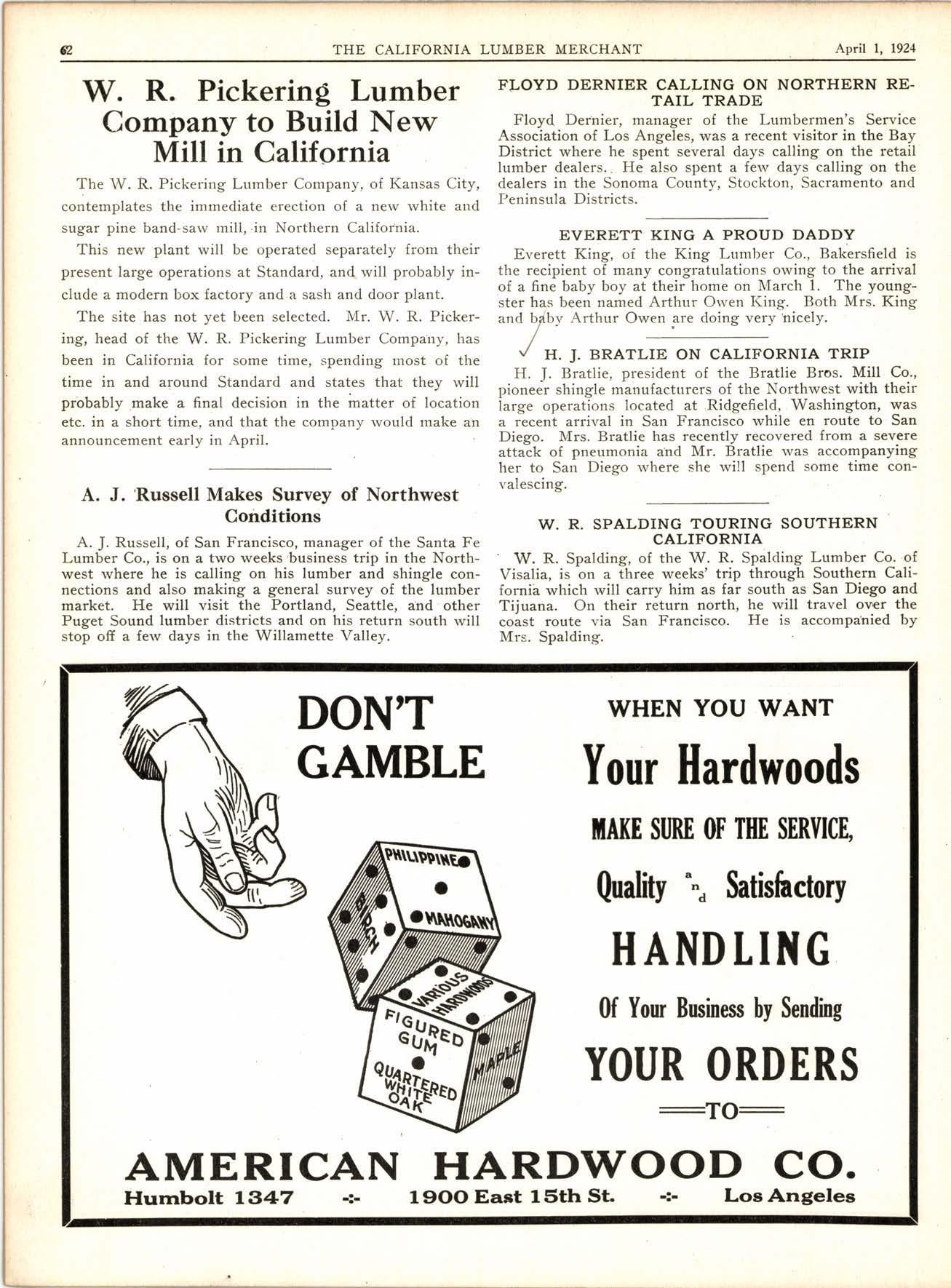
3 minute read
I L. V & H. E CO
Pacific Coast Lumber
ANYTHING IN DOUGLAS FrR (O. P.) WESTERN HEM LOCK, RED CEDAR AND SPRUCE.
(Continued from Page 44)

The high lead is in general use by private operators. The Forest Service prohibits its use in Government satre areas but does permit the use of a msdified lead, the block to be placed not higher than 35 feet' This serves to loeep the line on the ground for the greater part of the haul and the destruction resulting from the passage of the loe through the woods is not nearly so sriat as with the high lead. Foresters and iome lumbermen hold that the high lead is so destructive in its operation that it should not be used, but most operators maintain that it is cheaper than the modified lead and continue to use it despite its destructive efiects on the forest. The differtnce in cost between these metthods is a matter of dispute and results of a study made in 1923 witt le discussed on Saturday at a meeting of the California Forestry Committee. If the margin in cost is not wide, lumberllen, I think,-will be glad to consider the adoption of 'the modifitd lead because of its less destructive nature. If there is a margin in favor of the high lead, foresters, and I beI'ieve the consuming public, will demand its abandonment on the ground that the destruction done by it, far outweighs its advantases and thai its use must be prohibited if our- forest lands are to keep productive. Its abolition may mean a slight increase in the cost of lumber but even so that is part of the price the public must rday if we are to avoid a d,ire'stringency in the supply of wood products in times to come.
If lumbermen do not voluntarily abandon the use of methods which leave appalling destructidn in their walce, some public agency must see to it that they desist through regulation.
Ta:ation
Taxation presents another problem. Admittedly operation of present tax nrethods oresent obstacles to reforestation of cutover iands. so well known that it is not necessarv io discuss them in detail. Lumbermen, uniied with foresters to get legisrlation throush last vear to ameliorate the tax burden o-n toceel-off land but the bi{l was vetoed on thi-cround of its uncon#itutionality. An immediite need is a constitutional amendment, and all interested agencies should get behind a move to put this'' over this year.
Attitude of Lumbermen Towards a National Forest Policy
The lumbermen have supported legislation outlining a cooperative program between s*at€s, private owners and the Federal Government, whene police power remains with the States. They have been strongly opposed to bills proposing Federat regualtion of privately owned timber lands. Lumbermen have accepted and supported State regulatory legislation where it dealt with prictices already proven not to be costly. Lumbermen have, however, not been inclined, in my opinion, to recognize that thev are dealine with a resouroe which in its bresent andJuture use, is linked so insepirably with the welfare of the Nation that theie r€sts upon them a very definite and clean cut responsibility to reduce waste of present and potential raw material to the lowest possible minimum compatible with reasonable cost of finished product to the consum€r. They therefore took askance at resulations which might in some degree ilo* uptheir operations, reducing iheir output or making it cost more. The consumingi public is beginning to insist- .iq louder tone than heretofore that public agencies, State or Federal, see toit that ti'is timber resource is handled in a manner that will guarantee, lqt-the best possi' ble utilization bf present raw material includins the elimination of wastt and, 2nd-the esiablishment of a budget system which will eventuallv provide fora balance between timber siowth and consumption. A change to a more conservative method of logging timber, the leaving of trees for seed and as a nucleus for future crops, higher charges for necessary protection of crops, all thesc will undoubtedly cost more money' If lumbermen cannot-make a fair profit on their investment they will not continue in business. But wood is necessary to people and industrv. and the lumberman is here to stay. if, because of our shortsightedness 'in the past, it is going to cost money to get back to a sound forestry basis, the public must pay for such a move and will pay as lons as it is assured that the manufacturer of t-he raw material is getting a reasonable profit out of his business and not an exhorbi'tant one.
Let the tumberman meet his obligation by acknowledging his responsibility. Let him put into efiect, voluntarily, forest practices proved essential in the harvesting of forest products, and in the protection of cut-over areas. Then there will be little need of placing mendatory legislation on the statute books. But let him hesitate too long in putting such practices into effect and the State must act without political chicanery in its laws or political influencc in their enforcement. If both these agencies fail, then the Federal Government must intervene for the saving of a resource that is as an artery
(Continued on Page 63.)
We carry in ctock in orr San Francirco Yard for









